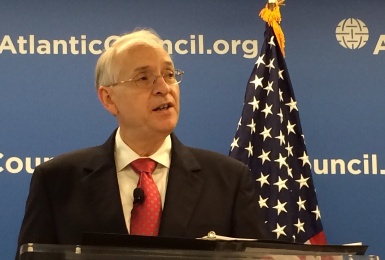U.S. does not support al-Hilu call for self-determination
April 28, 2020 (KHARTOUM) – U.S. Special Envoy to Sudan Donald Booth said he tried to convince the SPLM-N al-Hilu to engage in peace talks with the Sudanese government and stressed that he told them that his country would not support their demand for self-determination.

Speaking about the ongoing peace talks in Juba, Ambassador Booth said progress has been achieved in the discussions between the government and the armed groups except for the SPLM-N al-Hilu and the Sudan Liberation Movement led by Abdel Wahid al-Nur.
He said the SPLM-N al-Hilu has insisted that the transitional government should declare that Sudan would be a secular state while the government that the secularism and the role of Sharia (Islamic law) should be settled by the constitutional conference.
“They (the government) have pointed out that they had made changes to many laws: they have bravely increased religious freedom, restricted the application of Sharia law but that sort of retail approach has not satisfied the SPLM-N al-Hilu faction,” he said.
In return, in the SPLM-N al-Hilu they have pushed the idea of self-determination “which in effect means independence,” he added.
“I have tried to convince them that is something even the United States or others will not support,” he stressed.
Al-Hilu conducted a split in the SPLM-N because Malik Agar the then leader of the unified group and the Movement’s secretary-general Yasir Arman who was also the chief negotiator refused his request to demand the inclusion of the self-determination in the talks with the former Islamist regime of Omer al-Bashir.
The U.S. special envoy further spoke about the SLM-AW led by al-Nur who “remains in exile in Paris”.
Prime Minister Abdallah Hamdok last September met with al-Nur in Paris to convince him to join the South Sudanese mediated process. But the holdout leader rejected the idea, saying the armed groups participating in the talks seek positions not to address the demands of the conflict-affected civilians.
Booth said he told the Sudanese government that they should focus on addressing the root causes of the conflict more than on bringing armed groups to the negotiating table.
“One of the things that I discussed with the transitional government that the peace talks are great and there should definitively focus on getting into an agreement but the more important actually is to address the root causes of the problems”.
“Some of those problems have been discussed during the negotiations but there is the option for the government simply to move forward and address those root causes should leaders like Abdel Wahid not come to the negotiating table,” he emphasized.
(ST)
